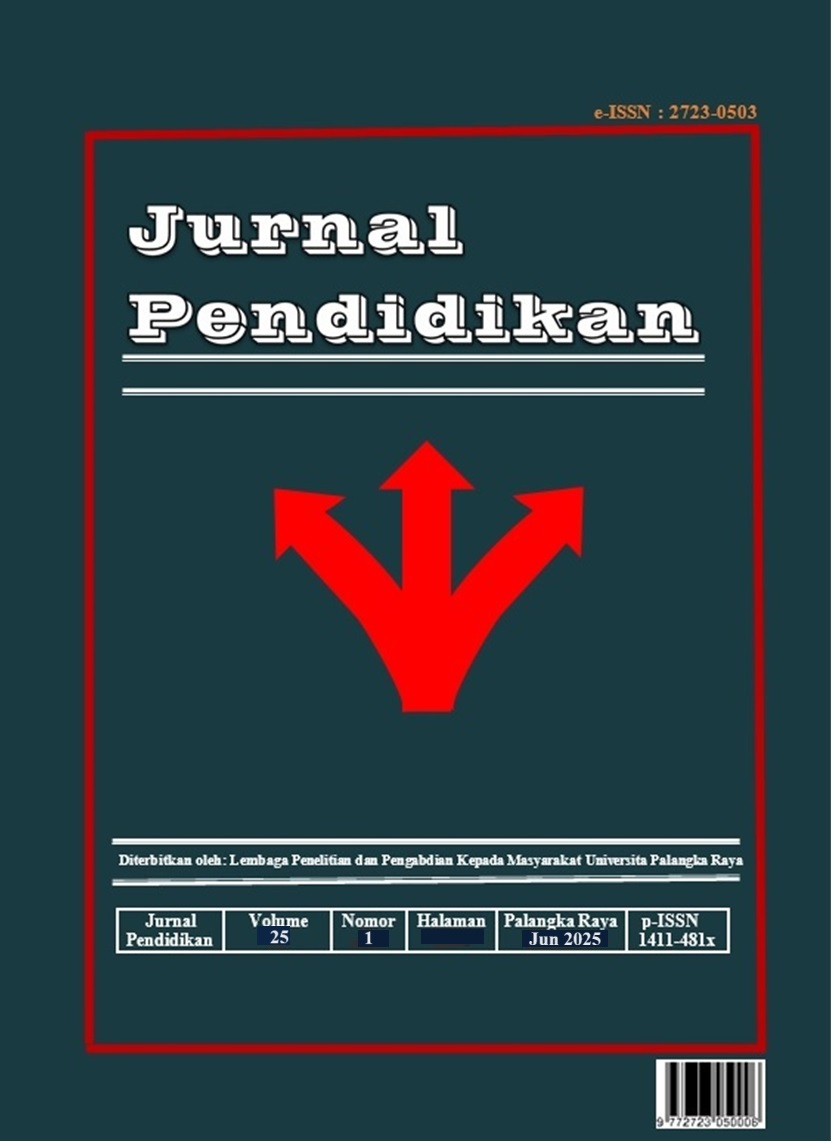Mentor Teachers' Perceptions Toward the Pedagogical Competence of Pre-Service Teacher Professional Education, FKIP, University of Palangka Raya in Practical Field Experience
DOI:
https://doi.org/10.52850/jpn.v25i1.12827Kata Kunci:
perception of mentor teacher, pedagogical competence, PPLAbstrak
Tujuan dalam penelitian ini adalah untuk mengetahui persepsi guru pamong tentang penguasaan kompetensi pedagogik mahasiswa Program Studi PPG Prajabatan FKIP Universitas Palangka Raya tahun 2022 dalam Praktik Pengalaman Lapangan (PPL). Penelitian ini menggunakan pendekatan kuantitatif dengan jenis penelitian deskriptif. Penelitian melibatkan 15 orang guru pamong sebagai subjek, dengan objeknya adalah mahasiswa Program Studi PPG Prajabatan FKIP Universitas Palangka Raya tahun 2022 sebanyak 62 orang yaitu gelombang I sebanyak 33 orang dan gelombang II sebanyak 29 orang. Pengumpulan data dilakukan dengan menggunakan angket yang telah divalidasi oleh tiga orang ahli dan diperoleh nilai V (Indeks Aiken) = 0,92 > 0,8 termasuk dalam kategori tinggi dan nilai PA (Percentage of agreement ) = 93% ,artinya layak digunakan untuk mengambil data. Hasil penelitian menunjukkan bahwa pada gelombang I, diperoleh 3 mahasiswa (9,09 %) kategori tinggi, 24 mahasiswa (72,73 %) kategori sedang dan 6 mahasiswa (18,18 %) kategori rendah, dan pada gelombang II diperoleh 4 mahasiswa (13,79 %) kategori tinggi, 20 mahasiswa (68,97 %) kategori sedang dan 5 mahasiswa (17,24 %). kategori rendah. Dari gelombang I dan II terlihat bahwa frekuensi terbesar berada pada kategori sedang, sehingga dapat disimpulkan bahwa persepsi guru pamong tentang penguasaan kompetensi pedagogik mahasiswa Program Studi PPG FKIP Universitas Palangka Raya tahun 2022 termasuk kategori sedang.
Unduhan
Referensi
Abbas, A., Amaliawati, S., Aulia, N., & Agustiningrum, T. (2023). PPG Students’ Perception of PPG Program in Developing Their Teaching Ability. Global Synthesis in Education Journal, 1(2), 65–74. https://doi.org/10.61667/9y6ksm24
Astari, A. R. N., Khairiah, & Mindani. (2021). PERAN MANAJEMEN SUMBER DAYA MANUSIA DALAM PROSES IMPLEMENTASI KOMPETENSI PEDAGOGIK DOSEN PADA PEMBELAJARAN TATAP MUKA TERBATAS DI FAKULTAS TARBIYAH DAN TADRIS UIN FATMAWATI SUKARNO BENGKULU. JUSIE (Jurnal Sosial Dan Ilmu Ekonomi), 6(01), 29–38. https://doi.org/10.36665/jusie.v6i01.414
Breines, M. R., & Gallagher, M. (2023). A return to Teacherbot: rethinking the development of educational technology at the University of Edinburgh. Teaching in Higher Education, 28(3), 517–531. https://doi.org/10.1080/13562517.2020.1825373
Dabbagh, N. (2019). Effects of PBL on Critical Thinking Skills. The Wiley Handbook of Problem‐Based Learning, 135–156. https://doi.org/10.1002/9781119173243.ch6
Dharmayana, I. W., & Alexon. (2019). TRIADIK, VOLUME 18, No.2, OKTOBER 2019. Triadik, 18(2), 33–46.
Fahkiroh, A., Fatmawati, D. P., & Amalia, S. R. (2023). Studi Literatur: Literasi Digital Sebagai Dasar dari Kompetensi Pedagogik pada Calon Guru Matetatika di Era Society 5.0. ProSANDIKA UNIKAL (Prosiding Seminar Nasional Pendidikan Matematika Universitas Pekalongan), 4(1), 529–538. https://proceeding.unikal.ac.id/index.php/sandika/article/view/1246
Faisal, F. (2021). C-NAR: Best Practice Tindakan Pembimbingan Berkelanjutan PPL PPG Prajabatan Universitas Negeri Medan. Jurnal Inovasi Pendidikan Dan Pembelajaran Sekolah Dasar, 5(1), 1. https://doi.org/10.24036/jippsd.v5i1.112932
Ferdianto, F., Raharjo, J. F., Hendayana, S., Supriatna, A., & Hidayat, A. (2020). The analysis of PPG Students’ Mistake in Learning Daring Process. Proceedings of the 7th Mathematics, Science, and Computer Science Education International Seminar, MSCEIS 2019. https://doi.org/10.4108/eai.12-10-2019.2296396
Fitriani, I., Julianda, R. C., & Sari, D. R. (2024). Motivation, Professionalism, and Language Skills: An Analysis of the PPG Prajabatan Program in Indonesia. JPGENUS: Jurnal Pendidikan Generasi Nusantara, 1(2), 141–155. https://doi.org/10.61787/6hq90h46
Jurakulov, S. Z., & Nurboyev, O. (2023). in the Educational Field of Physics Level and Position. Golden Brain, 1(33), 157–161. https://researchedu.org/index.php/goldenbrain/article/view/5474
Kay, S. (1997). Choosing Qualitative Research: A Primer for Technology Education Researchers. Journal of the Royal Society of Medicine, 90(4), 239. https://doi.org/10.1177/014107689709000431
Ngo, T. T. A. (2017). Emerging Technologies in Learning. More than One Article, 18(November 2017), 164–187.
Rahayu, P. (2021). Efektivitas Pengembangan Lembar Kerja. 6, 92–99.
Riyana, M., Hiskya, H. J., Suradji, F. R., & Hanifah, S. (2024). Analisis Kepuasan Sekolah sebagai Pihak Penerima Mahasiswa PPL PPG Prajabatan dalam Upaya Meningkatkan Kualitas Pendidikan. Edukatif: Jurnal Ilmu Pendidikan, 6(1), 385–392.
Wulandari, E., Sutikyanto, & Mujiyanto. (2024). Optimalisasi Praktik Pengalaman Lapangan dalam Meningkatkan Kompetensi Pedagogik Calon Guru. Jurnal Educatio, 10(1), 98–104.
Yulianto, H. (2018). Enhancing Efl pre- service teachers ’ pedagogical competence through PPG. Proceedings: The International English Language Teachers and Lecturers Conference (INELTAL) 2018 Detail, 56–59.
Unduhan
Diterbitkan
Cara Mengutip
Terbitan
Bagian
Lisensi
Hak Cipta (c) 2024 Janu Pinardi, Abdul Rahman, Bejo Basuki, Emy Artuti, Oktaviana Ainun Ratnawati

Artikel ini berlisensi Creative Commons Attribution-NonCommercial-NoDerivatives 4.0 International License.





